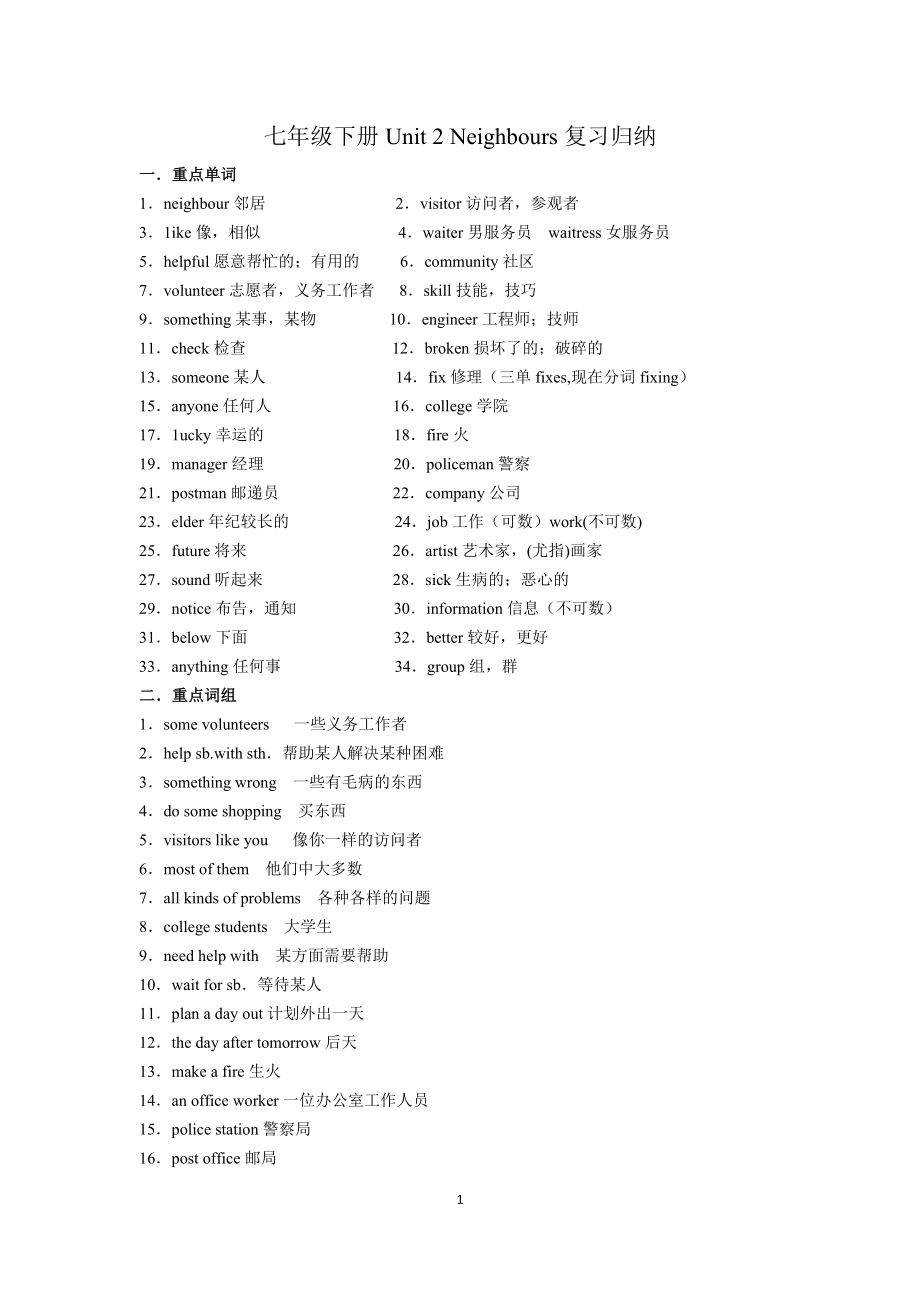《七年級(jí)下冊(cè)Unit 2 Neighbours復(fù)習(xí)歸納》由會(huì)員分享,可在線閱讀�����,更多相關(guān)《七年級(jí)下冊(cè)Unit 2 Neighbours復(fù)習(xí)歸納(3頁(yè)珍藏版)》請(qǐng)?jiān)谘b配圖網(wǎng)上搜索。
1����、七年級(jí)下冊(cè)Unit 2 Neighbours復(fù)習(xí)歸納
一.重點(diǎn)單詞
1.neighbour鄰居 2.visitor訪問(wèn)者����,參觀者
3.1ike像,相似 4.waiter男服務(wù)員 waitress女服務(wù)員
5.helpful愿意幫忙的���;有用的 6.community社區(qū)
7.volunteer志愿者�,義務(wù)工作者 8.skill技能�����,技巧
9.something某事��,某物 10.engineer工程師��;技師
11.check檢查 12.broken損壞了的��;破
2���、碎的
13.someone某人 14.fix修理(三單fixes,現(xiàn)在分詞fixing)
15.a(chǎn)nyone任何人 16.college學(xué)院
17.1ucky幸運(yùn)的 18.fire火
19.manager經(jīng)理 20.policeman警察
21.postman郵遞員 22.company公司
23.elder年紀(jì)較長(zhǎng)的 24.job工作(可數(shù))work(不可數(shù))
25.future將來(lái)
3�、 26.a(chǎn)rtist藝術(shù)家,(尤指)畫(huà)家
27.sound聽(tīng)起來(lái) 28.sick生病的����;惡心的
29.notice布告,通知 30.information信息(不可數(shù))
31.below下面 32.better較好����,更好
33.a(chǎn)nything任何事 34.group組,群
二.重點(diǎn)詞組
1.some volunteers 一些義務(wù)工作者
2.help sb.with sth.幫助某人解決某種困難
3.something wrong 一些有毛病的東西
4.
4�、do some shopping 買東西
5.visitors like you 像你一樣的訪問(wèn)者
6.most of them 他們中大多數(shù)
7.a(chǎn)ll kinds of problems 各種各樣的問(wèn)題
8.college students 大學(xué)生
9.need help with 某方面需要幫助
10.wait for sb.等待某人
11.plan a day out計(jì)劃外出一天
12.the day after tomorrow后天
13.make a fire生火
14.a(chǎn)n office worker一位辦公室工作人員
15.police s
5、tation警察局
16.post office郵局
17.by bike乘自行車= on the bike
18.in the future在未來(lái)
19.sound like+名詞 聽(tīng)起來(lái)像
20.be good at drawing擅長(zhǎng)繪畫(huà)
21.the information below下面的信息
22.worry about為……擔(dān)心
23.make you feel better使你感到更好 make sb. do sth.
24.feel well感覺(jué)好(身體好)
25. be ready to do sth.樂(lè)于做某事
26 ask sb. to
6����、 do sth. 請(qǐng)某人做某事 否定形式 ask sb . not to do.
27. ask sb. for + 名詞 ask sb. for help尋求某人的幫助
三.重點(diǎn)句型及點(diǎn)撥
1.I’m afraid they won’t welcome visitors like you.恐怕他們不會(huì)歡迎像你一樣的拜訪者。
be afraid+從句
be afraid of sth
be afraid to do sth
2.There’s something wrong with my computer. 我的電腦出故障了�����。
(1) = Something is w
7����、rong with...
=...is broken.
=...doesn’t work.
=… isn’t working.
(2)否定句 There isn’t anything wrong with my computer.
= There is nothing wrong with my computer.
(3)something是不定代詞,當(dāng)形容詞修飾這類不定代詞時(shí)�,形容詞必須后置。如:
I have something important to tell you .我有一些重要的事情告訴你���。
3.They help us w
8��、ith all kinds of problems.他們幫助我們解決各種難題��。
help sb.with sth.意為“幫助某人解決難題’’���,=help sb. (to) do sth.
4.Some of them often visit the old people and do some shopping for them.他們中的一些人經(jīng)
常會(huì)去探望老人并為他們采購(gòu)些物品。
do some shopping= go shopping�����。在疑問(wèn)句中���,也用some而不用 any���。
do some reading(閱讀), do some cooking(燒飯)�,do
9、some washing(洗衣服)����。
5.You’re lucky to live in a neighbourhood like that.你真幸運(yùn)住在像那樣的居民區(qū)。
=It’s lucky for you to live in a neighbourhood like that.
6. When people don’t know…., the artists will give them some ideas.當(dāng)人們不知道…時(shí)��,藝術(shù)家們將給他們一些主意。
when意為“當(dāng)……時(shí)’’���,是連詞�,引導(dǎo)時(shí)間狀語(yǔ)從句�����,從句中常用一般現(xiàn)在時(shí),而主句可用一般將來(lái)時(shí)��,即所謂的“主將從現(xiàn)
10�、’’原則。如:
I’ll go to the park when I’m free tomorrow.當(dāng)我明天有空時(shí)����,我將去公園。
7.People will get help if there is something wrong with their washing machine or fridge.
假如人們的洗衣機(jī)或冰箱壞了����,他們將得到幫助。
if意為“假如�����,如果"����,引導(dǎo)條件狀語(yǔ)從句��,句中常用一般現(xiàn)在時(shí),而主句可用一般將來(lái)時(shí)��,即所謂的“主將從現(xiàn)’’原則��。
If it rains tomorrow�����,I’ll stay at home.假如明天下雨,我將待在家里�。
11、8.That sounds like a good idea..那聽(tīng)起來(lái)是個(gè)好主意�����。
sound是連系動(dòng)詞�,意為“聽(tīng)起來(lái)……’’,后接形容詞�;sound like后接名詞
Your idea sounds great.你的主意聽(tīng)起來(lái)棒極了。
9.Please look at the information below.請(qǐng)看下面的信息�����。 ’
information是不可數(shù)名詞,below是副詞���,故修飾名詞時(shí)需后置�����。
10.They will make you feel better! 他們將使你(們)感覺(jué)更好!
make意為“使�����,讓"�,是使役性動(dòng)
12����、詞,后接動(dòng)詞原形或形容詞作賓語(yǔ)補(bǔ)足語(yǔ)���。如:
His words make me happy.他的話讓我開(kāi)心�����。
I will make Jim fix the bicycle.我將讓吉姆修理自行車�����。
11.Are you worrying about what to wear to a party or how to design your home?你在為參加聚會(huì)該穿什么或者怎樣設(shè)計(jì)你的家而煩惱嗎?
(1)worry about意為“擔(dān)心……’’�����。如:Don’t worry about me.別為我擔(dān)心��。
(2)what to wear與how to design是“
13�、疑問(wèn)詞+動(dòng)詞不定式"結(jié)構(gòu),此結(jié)構(gòu)在句中作賓語(yǔ)����。
四.重點(diǎn)語(yǔ)法
一般將來(lái)時(shí)
一般將來(lái)時(shí)表示將來(lái)某個(gè)時(shí)間將要發(fā)生的動(dòng)作或存在的狀態(tài),
一般將來(lái)時(shí)的構(gòu)成:shall/will/be going to+v.��。
肯定句:主語(yǔ)+shall/will+動(dòng)詞+其他.
否定句:主語(yǔ)+shall/will+not+動(dòng)詞+其他.(will not= won’t)
疑問(wèn)句:Shall/Will+主語(yǔ)+動(dòng)詞+其他?
1.shall與第一人稱連用�,主要用于疑問(wèn)句中���。
2.will與第二�、三人稱連用�。
Which paragraph shall I read first?
14、我將先讀哪一段?
Will you stay at home this evening?今晚你在家嗎?
3.當(dāng)有跡象表明在近期或短時(shí)間內(nèi)有可能發(fā)生的動(dòng)作或打算�、準(zhǔn)備做的事
用be going to+v.。
(1)計(jì)劃��、安排要發(fā)生的事。
She is going to watch the film next week.
(2)有跡象要發(fā)生的事�����。
Look at the dark clouds�����,it is going to rain.看那些烏云����,將要下雨了。
易錯(cuò)點(diǎn):There be… 將來(lái)時(shí)——There will be.. There is going to be
3
 七年級(jí)下冊(cè)Unit 2 Neighbours復(fù)習(xí)歸納
七年級(jí)下冊(cè)Unit 2 Neighbours復(fù)習(xí)歸納

